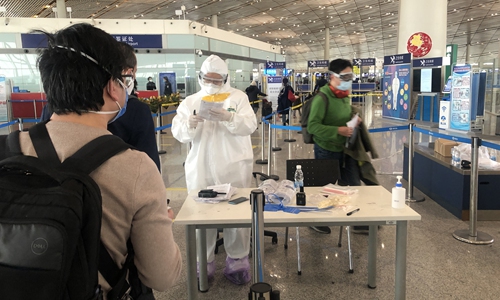HOME >> CHINA
Infection by imported cases spurs tightening
By Liu Caiyu and Xu Keyue Source:Global Times Published: 2020/3/25 0:38:41
More cities urged to follow Beijing with centralized 14-day quarantine

International passengers line up at a distance of 1 meter between each other when handing in the health declaration cards at the Beijing Capital International Airport. Photo: Liu Xin/GT
The emergence of domestic COVID-19 patients in China who were infected by people returning from overseas has promoted public calls to give all international arrivals mandatory 14-day quarantine terms in designated sites, as the current policy of allowing them to take home quarantine has shown apparent deficiencies.
The voices demanding quarantine of all inbound travelers in designated places has grown louder after Beijing and Shanghai on Tuesday each reported one local confirmed COVID-19 case that was linked to imported cases, following one detected in South China's Guangdong Province on Sunday.
The cause of infection of the Beijing patient, surnamed Liu, was possibly due to his sharing a stairway with a patient coming from the UK who was serving a home quarantine after arrival in China on March 5, the Beijing Center for Disease Prevention and Control said Tuesday.
As of Monday, China had confirmed 427 imported cases, including 380 Chinese citizens and 47 foreign citizens, China's Foreign Ministry said on Tuesday.
Previously, Beijing had allowed passengers to apply for home quarantine if they lived alone or all family members needed quarantine, but it revoked the measure on Tuesday, saying all people entering Beijing from overseas will face a centralized quarantine in the capital for 14 days upon arrival starting from Wednesday.
Home quarantine is inadequate, because in many communities, residents are able to go out with an entry permit and no one can keep an eye on them all the time, a community worker surnamed Meng in Beijing told the Global Times on Tuesday.
"The 14-day intensive quarantine on centralized and designated sites should be the most thorough and safest method, where staff members stationed there will look after us in every respect," Wendy Yang, who came back from Spain and now is quarantined at a hotel in Beijing, told the Global Times.
"I did not take a single step out of my door," she said.
Other Chinese cities need to learn from Beijing by plugging the loopholes in home quarantine and adjusting their policies immediately to enforce a centralized quarantine of all passengers on arrival from abroad, netizens posted online on Tuesday.
Most Chinese cities and provinces, such as South China's Guangdong Province and Shanghai, allow travelers to apply for home quarantine if they live alone or all family members in a house face quarantine.
Due to the cost factor, it seems unrealistic to impose the "closed-loop" measures of quarantining all inbound travelers in centralized places, although some cities require quarantined people to pay their own bills, said Zhu Lijia, a professor of public management at the Chinese Academy of Governance.
Wang Peiyu, deputy head of Peking University's school of public health, also told the Global Times that Chinese cities should test all inbound travelers upon arrival. Nucleic acid testing could screen most infected cases.
Except major cities and provinces, such as Beijing, Shanghai and Guangdong Province and Yantai, a city from Shandong Province, which had stepped up efforts to guard port entry by testing all passengers, many other Chinese cities only test passengers from major pandemic-stricken regions.
But Zhu argued testing all inbound passengers would be a huge workload for customs entry ports and airport staff and will use large amounts of medical resources, so it is difficult to implement in reality.
Wang also said sometimes, a nucleic acid testing could be inaccurate, therefore to completely cut off the transmission channel, cities should impose 14-day centralized quarantine on all inbound travelers. Some cases of virus carriers could test negative for COVID-19 one time if they are at the early stage of infection or still in the incubation period, studies showed.
Posted in: SOCIETY